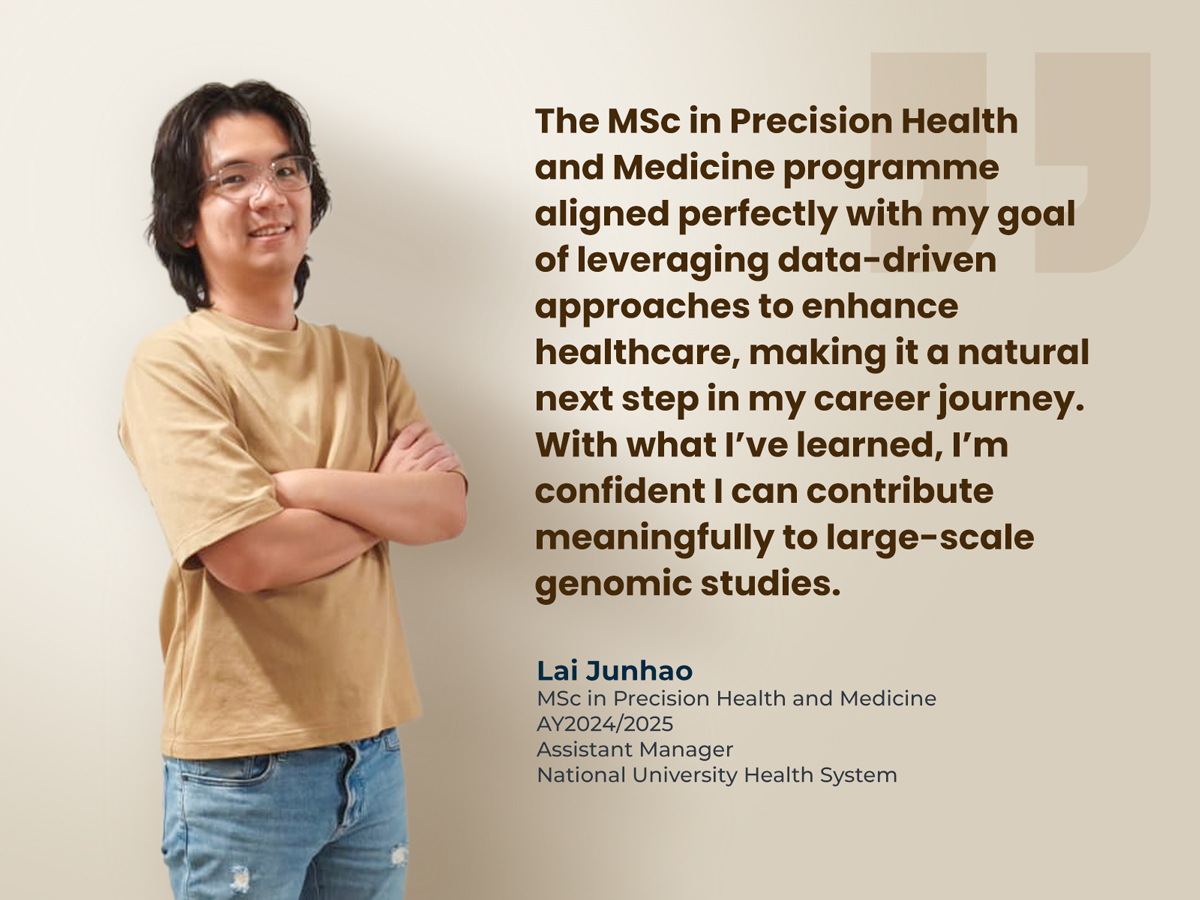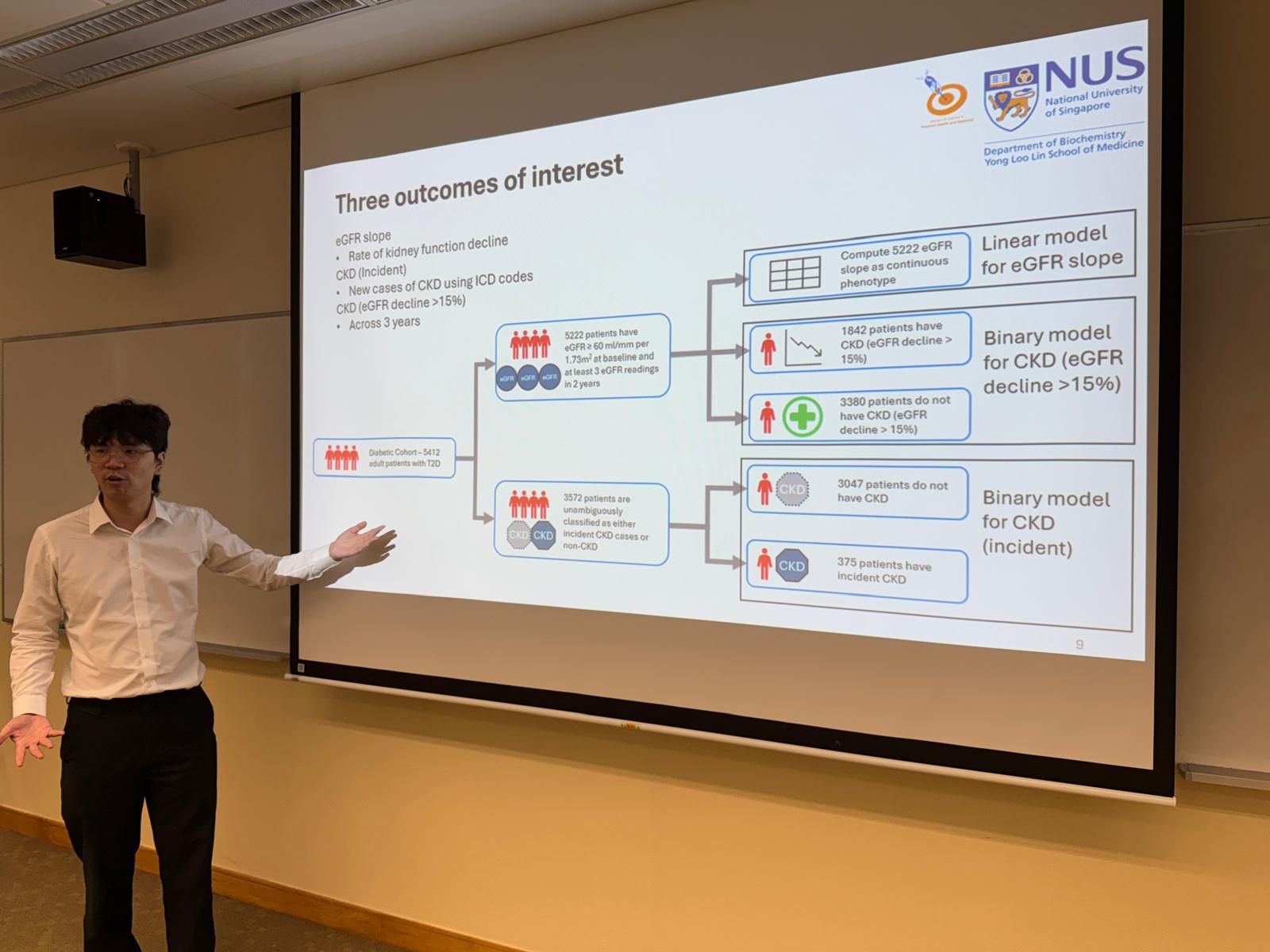
News & Stories
Latest News & Stories
When Lai Junhao graduated with a degree in physics, a career in genomics was not even on the horizon. He had never taken a biology course in his academic life. However, life has a way of rewriting our paths — sometimes in the most unexpected ways.
Just after graduation, Junhao was diagnosed with leukaemia. The months that followed were filled with uncertainty, chemotherapy and questions no 20-something expects to face. However, out of that experience came a shift in mindset — and a determined clarity about what he wanted to do with his life.
“Going through treatment changed the way I thought about everything,” he shares. “After experiencing firsthand what healthcare could do for me, I wanted to give back — to be part of the system that extended my life.”
Today, Junhao is a full-time student at the National University of Singapore (NUS) Master of Science in Precision Health and Medicine (MScPHM) programme — supported by a scholarship from Precision Health Research, Singapore (PRECISE). His goal? To use data to improve patient outcomes — the very thing that made the difference in his own life seven years ago.
Finding His Way into Healthcare
Junhao’s journey into healthcare did not happen overnight. He began his career as an educational content creator at the Singapore Institute of Technology (SIT), where he curated and created educational content for physics students. Soon, he found himself drawn to more applied work in data, eventually moving to take on a role as a software engineer and data analyst at the National University Health System (NUHS).
There, Junhao built dashboards, developed forecasting models and harmonised data from across NUHS hospitals — work that gave him a front-row seat to observe how healthcare systems function and where data could make a real difference.
One project involved developing a COVID-19 dashboard to monitor infection spread in migrant worker dormitories, and another used natural language processing (NLP) to analyse patient feedback across hospitals — identifying praise and pinpointing pain points by cluster, institution and specialty. He also worked on a model that forecasted magnetic resonance imaging (MRI) machine load and patient turnaround times, contributing to a data-driven decision by hospital leadership to purchase additional machines for ongoing and future operations.
When he received an email promoting the MScPHM programme at NUS, everything clicked. “The programme aligned perfectly with my goal of leveraging data-driven approaches to enhance healthcare, making it a natural next step in my journey.”

A Leap into Genomics — Without the Biology Background
Coming from a non-biology background, Junhao admits he had concerns at the start. “I didn’t take biology in Junior College, and my undergraduate degree was in physics,” he says. “So, there were knowledge gaps from day one.”
However, the programme’s structure, encouraging professors and his own determination helped bridge these gaps. He tells us: “Associate Professors Caroline Lee and Kenneth Ban repeatedly encouraged us and pointed us in the right direction. So, despite beginning my master’s degree journey from behind the starting line, I was able to catch up and keep pace.”
Among the courses that stood out for him was High Performance Computing for Precision Medicine, as it was his first introduction to high-performance computing and its many tools for looking at genomes. He explains: “Big data requires big tools. We learned how to use tools like PLINK and SAMtools, how to work in a Linux environment, and how to manage heavy workloads using workflow managers like Nextflow as well as Portable Batch Systems software.”
He also found Causal Inference in Precision Medicine particularly eye-opening. “In big data analysis, it’s difficult to establish causality. Does gene A affect gene B, or vice versa?” he says. The course introduced concepts like instrumental variables, Mendelian randomisation (a genetic analogy of randomised trials), and acrylic graphs for understanding cause-and-effect — all of which are essential for drawing meaningful conclusions in complex health data.
Creating a Future of Impact
Now nearing graduation, Junhao is focused on what comes next — and how he can continue to make a meaningful impact. With forward-looking programmes like Phen-Gen and Pre-Emptive Pharmacogenomics already underway at NUHS, he is excited about the opportunity to apply what he has learned in real-world settings.
“With what I’ve learned and my past experience, I’m confident I can contribute meaningfully to large-scale genomic studies,” he says. “Programmes like these are already taking shape at NUHS, and I hope to support these or similar efforts.”

Junhao presenting his Capstone Project in Precision Medicine. His project was Polygenic scores of multiple risk factors as predictors of chronic kidney diseases in individual with type 2 diabetes, and supervised by Dr Sim Xueling.
He is still deciding on his next step — whether to return to the workforce or pursue a doctorate. Whichever path he takes, Junhao remains grounded by the motivation that started it all — a desire to give back to the system that once saved him.
To learn more about the Master of Science in Precision Health and Medicine programme, click here
Videos

